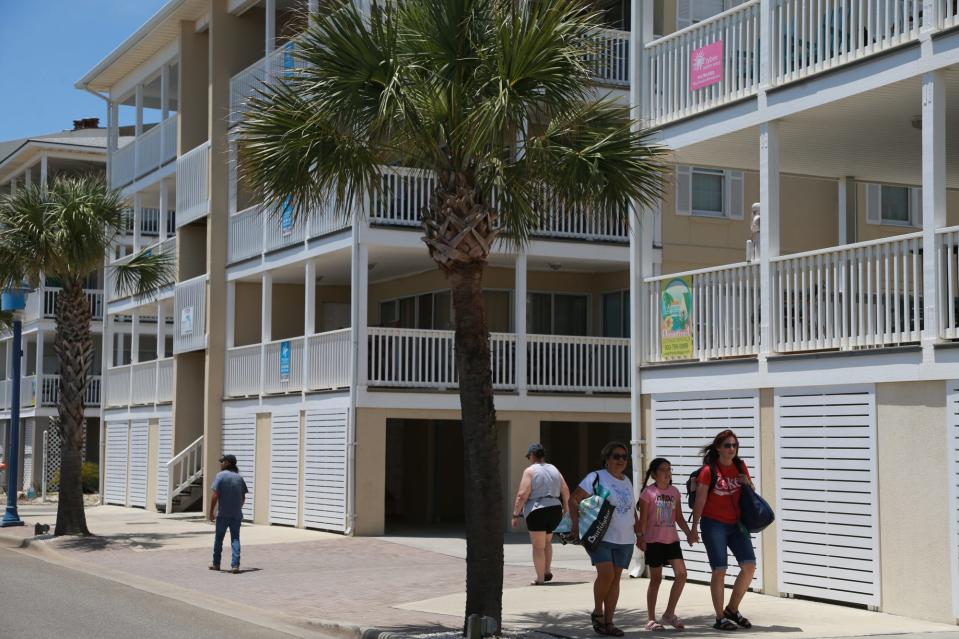Tybee Island continues effort to clean voter rolls; 27 names deemed ineligible
The Chatham County Board of Registrars has ruled that a total of 27 registered voters on Tybee Island most likely do not live in the city as their primary residence and are, therefore, unable to vote in future municipal elections.
During Wednesday’s special-called meeting, Tybee Island’s clerk, Jan Leviner, and resident Kenneth Williams collectively presented a total of 35 registered voters to the board to be challenged. Five of those voters will be re-evaluated at a future meeting and three had corresponded with the board and resolved their cases.
The remaining 27 have been moved to “challenge status.” That doesn't mean those people will be deleted from the voter list, but if they were to vote at their Tybee address again, they would have to prove their residency, according to Director of Voter Registration Sabrina German.
In-depth: Tybee residents challenge island's voter rolls. Georgia Secretary of State investigating.
Previous story: Tybee Island successfully challenges nine registered voters at Board of Registrars
Federal voting law states that electors must be registered to vote at their primary residence. That notion can be complex – think those who are deployed in the military or college students living away from home. Therefore, proving someone’s voter address is not their primary residence requires a substantial amount of evidence.
Further, the Chairman of Chatham County Board of Registrars Colin McRae stated, "The success on a municipal challenge requires a high burden of proof, given the significant deprivation of constitutional rights that a challenge to an individual's right to vote implicates.”
Cleaning the voter roll
“Cleaning” the voter roll – removing ineligible voters – is a biennial process at the state level. Local jurisdictions, however, have more discretion. The more clear-cut reasons for being removed: dying, serving out a felony sentence, or not having had contact with election officials for roughly nine years. Harder to prove, though, is if a voter’s registered address is their primary residence, which often falls to local elections boards.

Efforts to clean Tybee’s voter rolls gained renewed interest after last fall’s municipal elections. A group of concerned citizens believed that at least 100 out of the 1,306 total voters had voted for the new slate of council members even though they did not live on Tybee full time.
The group looked at different types of publicly available information that could indicate if an elector’s registered voting address was not their permanent residence. That included properties registered and recently advertised as a short-term vacation rental (on sites such as AirBnB), people whose most updated address differs from their registered Tybee address, and people with homestead exemptions outside of Tybee.
More: Tybee Island council delays vote on short-term vacation rental cap — but OKs limiting occupancy rate
The process was imperfect and some residents spoke out to dispute the findings. However, the body of research was sent to the Georgia Secretary of State's Office and prompted an ongoing investigation into the accuracy of Tybee’s voter rolls.
Leviner is actively working to verify the city’s voter roll, which listed about 3,400 active and inactive voters earlier this January. That number of registered voters is higher than the roughly 2,800 voting age residents on the island according to the 2020 census (important to note that experts have said the 2020 census is most likely an undercount).
Before: Tybee Island successfully challenges nine registered voters at Board of Registrars
In March, the Board of Registrars upheld nine Tybee challenges. Combined with Wednesday’s results, a total of 36 voters on Tybee’s voter roll have been moved to “challenge status” this year. Leviner said she plans on issuing around 40 more challenges in the next few months.
In previous years, evidence has fallen short of the threshold needed to challenge voters, said Board of Registrars member William Norse. According to Norse, people are gaining a better understanding of what information and documentation needs to be presented before the board.
During Wednesday’s meeting, successful challenges generally consisted of a combination of different factors: a homestead exemption outside of Tybee Island, utility bills indicating zero usage, property records indicating a sale to a new owner and a change of address in the National Change of Address (NCOA) database. In some cases, Tybee residents who personally knew the elector were also able to corroborate that the person had moved.
McRae has told the Savannah Morning News previously that it’s important to make each case as air tight as possible because erroneously removing voters off the roll could violate federal law. The city of Thunderbolt came under fire for this reason about five years ago.
Williams, the Tybee resident who had issued his own set of 10 challenges, said they will continue to work through the voter list. He and several other concerned citizens say the island’s small population means every vote counts. The island, which faces increasing tourism, has a large number of properties that serve as second homes or vacation rentals.
“Non-residents of Tybee Island could vote here and influence elections and decisions that affect residents,” said Williams.
Nancy Guan is the general assignment reporter covering Chatham County municipalities. Reach her at nguan@gannett.com or on Twitter @nancyguann.
This article originally appeared on Savannah Morning News: 27 Tybee Island voters deemed ineligible to vote by Chatham County

